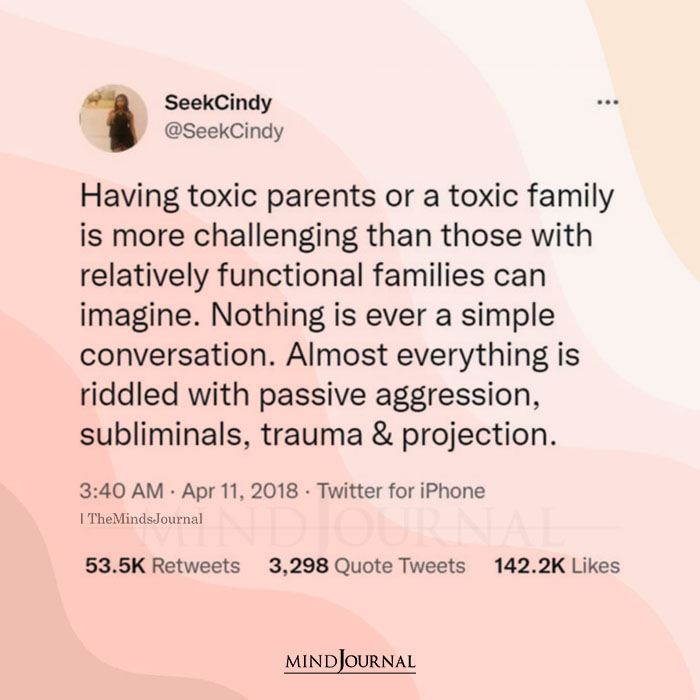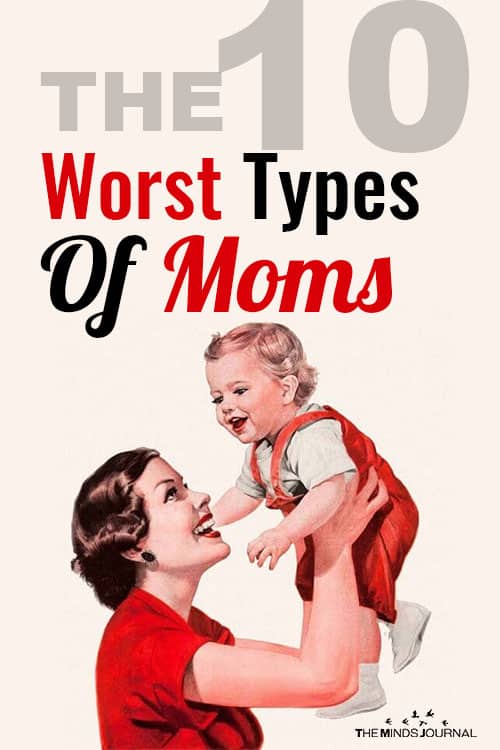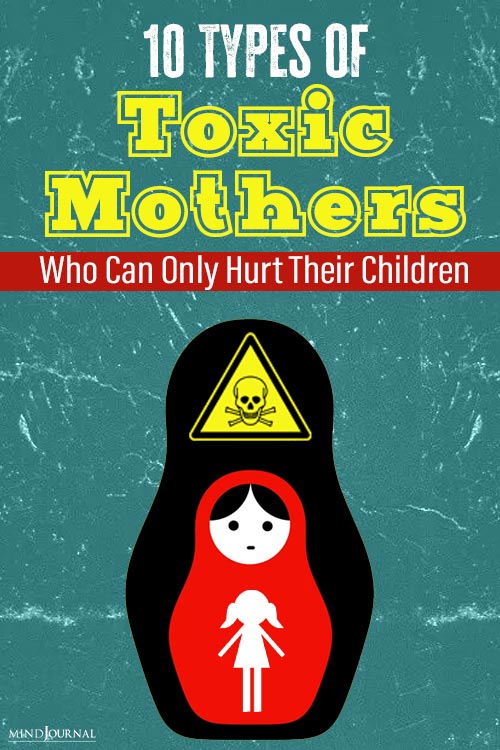Happy Mothers Day to all the amazing mothers out there! As we celebrate amazing mothers on this international mother’s Day, let’s also raise awareness about the different types of toxic mothers that exist, inflicting pain on their children.
Being a mother is often seen as a natural instinct for most women. However, some women may misunderstand the concept of being a loving mother, and instead become some of the worst types of toxic mothers.
These mothers end up causing untold harm to their children, without even realizing the damage they are inflicting.
When we think of a mother, we tend to imagine a woman who knows how to care for her child, show them affection, teach them values, and help them become responsible citizens in the future.
However, there are some types of toxic mothers who possess certain traits that not only make them terrible mothers but also deplorable human beings.
These toxic mothers have a negative impact on their children’s mental and emotional growth, and their relationship with their children is often strained or damaged.
Let’s explore the different types of toxic mothers, or the worst types of moms, and the impact they can have on their children.
Related: 10 Things Toxic Parents Say And What They Actually Mean
10 Types Of Toxic Mothers To Be Aware Of:
1. The Control Freak
These toxic mothers have an obsessive-compulsive personality that makes them want to control every aspect of their child’s life. They dictate how their child should live and undermine their autonomy.
According to NYC-based psychiatrist Kathryn Smerling, these mothers “project onto their daughter.” They reward their child for being like them and punish them for not being like them.
This controlling behavior can lead to the daughter feeling like a puppet or projection of her mother’s life, rather than her own autonomous person.

2. The Perfectionist
The perfectionist mother is another type of toxic mom that can have a detrimental effect on her children. Perfectionism is the relentless pursuit of flawlessness and the desire to appear perfect in all aspects of life.
Although perfectionism is often viewed as a positive trait, it can lead to certain mental health issues.
According to a 2011 study, “maladaptive, unhealthy, or neurotic perfectionism, where anything less than perfect is unacceptable, can leave individuals vulnerable to depression.”
Dr. Stephan Poulter, a family therapist and clinical psychologist, explains that the mother who strives for perfectionism is typically characterized as an overbearing and anxious woman, who places great emphasis on appearances.
As a result, her children tend to adopt a critical self-image, feeling insufficient and emotionally deprived.
This type of mother prioritizes appearances over her children’s emotional well-being, causing them to feel immense pressure to be perfect in everything they do.
3. The Critic
The Critic is undoubtedly one of the worst types of toxic mothers. These mothers never seem to be satisfied with their child’s actions, and instead of praising their achievements, they criticize everything they do.
They always seem to find faults in their child’s thoughts, behaviors, and actions and use them as a means of reprimanding them.
Statements like “You didn’t do well enough.” or “You always mess everything up, don’t you?” are common from this type of mother.
Growing up with an overly critical mother can cause a child to develop low self-esteem and lack self-confidence. Furthermore, they may also struggle with responsibility and self-discipline as adults.
Related: Lack Of Love From Mother: 5 Ways In Which Lack Of A Mother’s Love Affects Her Daughter’s Life
4. The Best Friend
While it’s important to have a friendly relationship with your child, trying to be their best friend is not a good approach to parenting.
Children need their parents to guide them, instill values, and teach them how to navigate life.
When parents prioritize being a friend over being a role model, they risk losing authority and can potentially misguide their children.
According to Gwen Dewar, Ph.D., studies show that children do better when their parents show affection and enforce appropriate boundaries on their behavior.
Dr. Stephan Poulter adds that some parents try to treat their children as equals to avoid setting boundaries, which can be harmful to the child’s development.
5. The Party Girl
While it’s understandable that you may want to have fun and enjoy your life before becoming a mother, it’s important to recognize that once you have children.
You have a responsibility to act maturely and set a good example for them. Unfortunately, the party girl’s mom is often too immature to understand this.
This type of mom is often reluctant to take on the responsibilities of motherhood and prefers to indulge in a carefree lifestyle.
Psychiatrist Kathryn Smerling explains that these types of moms may view parenting as simply keeping their child on the right track, rather than actively engaging in their child’s growth and development.
While there’s nothing inherently wrong with having a good time with your child, if that’s the only way a mother connects with her daughter, it’s a shallow and limited bond.
6. The Narcissist
The Narcissist mother is one of the most toxic types of moms as they are predominantly self-centered and unable to be good caregivers.
They view their children as an extension of themselves and fail to recognize their kids’ autonomy.
Clinical psychologist Dr. Poulter explains that these me-first mothers are often self-absorbed, and their insecurity prevents them from seeing their children as separate individuals.
This parenting style creates an unhealthy dynamic where the offspring learns to play a supporting role in their mother’s life, rather than developing their unique sense of self.
Related: 7 Things I Learned From Being Raised By A Narcissistic Mother
7. The Pessimist
Mothers with a pessimistic attitude can be detrimental to their children’s mental health and well-being as they can spread negativity throughout the family.
These mothers often suffer from high levels of stress and anxiety, which can lead to a negative outlook on life.
According to psychiatrist Kathryn Smerling, “A negative person is a depressed and angry person. She externalizes her problems onto someone else, making for a very painful mother-daughter relationship. It’s going to be a toxic relationship.”
To deal with a negative mother, it may be necessary to maintain distance until she seeks help to overcome her pessimistic attitude.

8. The Workaholic
Workaholic mothers often have little time for their children as they prioritize their work above all else.
According to Smerling, for a child to feel valued by their mother, the mother must be present and engaged. It’s not just about the quantity of time, but also the quality of that time spent together.
A mother must be fully present and attentive to her daughter to establish a deep, meaningful connection that makes the daughter feel heard, valued, and important.
9. The Unpredictable
The Unpredictable type of toxic mothers can be very challenging for their children. They tend to be highly temperamental, often exhibiting erratic behavior.
These women have a distorted self-image and can be very unreliable and unstable in their parenting style.
According to clinical psychologist Dr. Stephan Poulter, unpredictable mothers are frequently overwhelmed by their emotions, which are usually negative.
Their parenting style can vary greatly depending on their mood. Poulter notes that these moms tend to create “problems, issues, and crises in her mind, through her emotions and relationships, and pass them on to her children.”
This can have a detrimental effect on the child’s emotional well-being and make them feel unsafe and insecure.
Related: How An Unloving Mother Can Ruin Her Child’s Chance At Happiness
10. The Abuser
Abuse is a vicious cycle that can leave deep scars on a child’s mind and soul, even if the scars are not visible on the outside.
While physical abuse is often talked about, emotional and psychological abuse, as well as neglect, can be equally damaging.
A mother who neglects her child and fails to fulfill her responsibilities towards them is undoubtedly one of the worst types of moms out there.
By withholding love, affection, and care from their child, they inflict untold emotional pain and pave the way for serious mental health issues in the child’s adulthood.
It’s heartbreaking that some mothers can be so abusive toward their own children, but it’s important to acknowledge that abuse can take many forms.
We must work to stop all types of abuse and ensure that every child is loved, cared for, and protected.
As we celebrate Mother’s Day 2023, let’s not forget to recognize the existence of the 10 types of toxic mothers. It’s time for us to take a step back and examine ourselves, to see if we possess any negative traits that may affect our relationship with our children.
By acknowledging and addressing these traits, we can work towards becoming the loving, nurturing, and supportive mother that every child deserves.
Let’s make this Mother’s Day a reminder to strive for better parenting and to create a healthy and positive environment for our children to grow up in.
Want to know more about toxic mothers? Check this video out below!















Leave a Reply